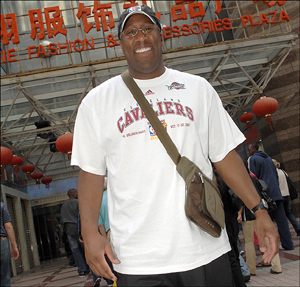If you missed it, go here for Part I of the story of John, an entrepreneurial field experiment. He’s a former wage slave who was lucky enough to get fired by a boss who wasn’t very good at assessing the value of his employees’ human capital. John got fired not over performance, but over money (among other things.)
(A note to bosses: do that, and you’re giving your employee a more accurate idea of his market value than working for you ever could.)
Sudden unemployment forced John to think entrepreneurially. He started a business, incorporated it, and started living for himself, his wife and his kid (drat, that just gave away the ending) rather than his boss’s yacht. John’s making far more than he did before, and can take days off at a stretch if he feels like it.
But there’s more, starting with the pride that accompanies ownership. That goes for what you drive, where you live, and especially where you work. There’s a reason why privately owned houses look nicer than Section 8 housing does. Any sane person will put more effort into maintaining something that’s his own, rather than something he has only a transitory interest in. (When was the last time you washed a rental car?)
Most salaried workers salivate at the idea of getting off work early, whether they choose to admit this or not. Your average successful entrepreneur just wants that day’s work to be completed, and doesn’t care if it takes 13 hours on that particular day, or 1.
In his new life as a business owner, John’s financial fate no longer rested in the hands of a single, capricious, inherently flawed human: a boss whose job description mandates paying John as little as possible.
Instead, all John had to do now was just please customers. The more he pleased (and continues to please) them, the richer it made him. The money is fine in and of itself, but every dollar Dog & Pony earns gains him greater self-determination. So why don’t more people do this?
Going it alone had crossed John’s mind before, but getting fired gave him the necessary impetus.
I had run my own company for a short time while in Detroit, but gave up on it too early. I did sound design for car commercials and used someone else’s studios. It turned a profit, but I just wasn’t prepared. And the paperwork overwhelmed me. When I received an offer to be a salaried employee at another studio I took it, and a year later Omega Center hired me.
Once they fired me, I had no choice, so this time I knuckled down and got it done.
To start a sound design business, you need a big initial outlay on equipment. With his savings hovering around 0, John buttressed them with an, ahem, credit card advance and an $18,000 second mortgage[1].
That took care of capital expenditures. Labor expenditures, at the start, were staring at him in the mirror every morning. Clients, he got through word-of-mouth and “some judicious cold calling.” That leaves the dull but critical process of getting things nice and legal.
I got the business up and licensed with the state and then went to the county to figure that part out. Given the choice between doing business as a limited liability company or an S Corporation, I went with the latter. It gives me tax advantages and better protection from libelous types.
That part can’t be underestimated. We show you how to set up an S corporation (or an LLC, which you shouldn’t immediately rule out) quickly and without fuss in our new ebook.
It took John 6 months to turn a profit. As to the magic formula for transitioning from tentative to successful, here’s it is:
You just have to keep plugging away. There’s no magic formula, just hard work and ignore the self-doubts.
The next MBA-level textbook that has that passage in it will be the first.
John started by creating a studio in his house, using the home equity line of credit to buy a laptop, a microphone and some odds and ends. The line of credit paid for more equipment as the business took off: he soundproofed one end of a hallway and created an isolation chamber to record voice talent in. John purchased an Integrated Services Digital Network line, enabling him to send and receive sound files in real time to and from anywhere. (By the way, he paid the initial advances off in 2 years.)
Eventually, with the business growing several-fold (and John’s family growing by 50%), it came time to move into real offices. Which sounds expensive to the untrained ear, but
I turned to my network and found a great banker who listened to my pitch and believed in my company.
Today, Dog & Pony has 3 full-time employees and grosses about $600,000 a year. The studios sit in the epicenter of Las Vegas, the city with the worst unemployment in the state with the worst unemployment in the country. Yet Dog & Pony’s revenues have increased in each of the last 4 years.
John did go to college, but not for this. There are hundreds of schools that offer useless degrees in subjects like women’s studies and sociology, but only a handful that have begun teaching the practice and study of entrepreneurship. (They include the University of Nevada-Las Vegas, whose entrepreneurship program CYC’s own Betty Kincaid helped found.)
John’s personality and attention to detail made him popular among peers and clients while he worked for Omega Center, but that reputation only translated into so many dollars while he was an employee. Actually, it only translated into so many 7¢ amounts: see Wednesday’s post. When John became a business owner, his positive reputation turned from a desirable attribute into a force multiplier. The beneficiary of his hard work, commitment, and reputation was now him. Just as it should be.
John didn’t have a 5-year plan. No sales goals, no revenue goals. He had literally no expectations. Which doesn’t mean he thought he was going to fail, but rather it means he took success as it came. He doesn’t hire people on a schedule, but as they become necessary:
I couldn’t handle the phone calls, billing and studio work so I needed an assistant. When there was too much studio work for just me as a producer, I hired another. And so on…
As for the numerical drudgery of bookkeeping, taxes, and payroll, those are easy enough to handle that Dog & Pony does most of it internally.
It’s surprisingly easy to run QuickBooks if you just knuckle down and read the damn manual. Our office manager/zookeeper handles it, and a once a month we receive a visit from a professional bookkeeper. And we have a great accountant.
You can see John is full of regret, and dying for a chance to return to the unpredictability of a “steady” job.
What was the hardest part about deciding “OK, I’m going it alone?”
Just doing it. Sorry to sound like a Nike commercial, but the biggest impediment is always self-doubt. If you can get past that hurdle, and your skill or business is viable, then you’re on your way.
Controlling your destiny is what this whole personal finance game is ultimately about. We’ll say it again and again. You can do this. John proved as much. But the 2nd, 3rd, 4th, 5th and thousandth steps can’t happen until you take the 1st.
[1] Do we recommend this? Under normal circumstances, of course not. But John wasn’t buying jetskis or installing an atrium. He was purchasing his destiny. To draw a parallel, under normal circumstances you shouldn’t stuff your face with Klondike bars and Jack Links. But if you’re emerging from a week on the Ross Ice Shelf without food, then eat whatever you can get your hands on. Worry about survival first, and only make decisions about quality once you have the luxury of doing so.
**This article is featured in the Carnival of Personal Finance #331-Global Stock Markets Edition**





